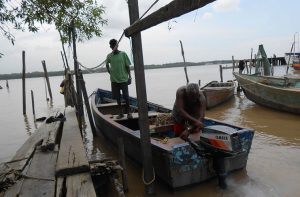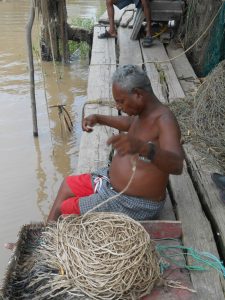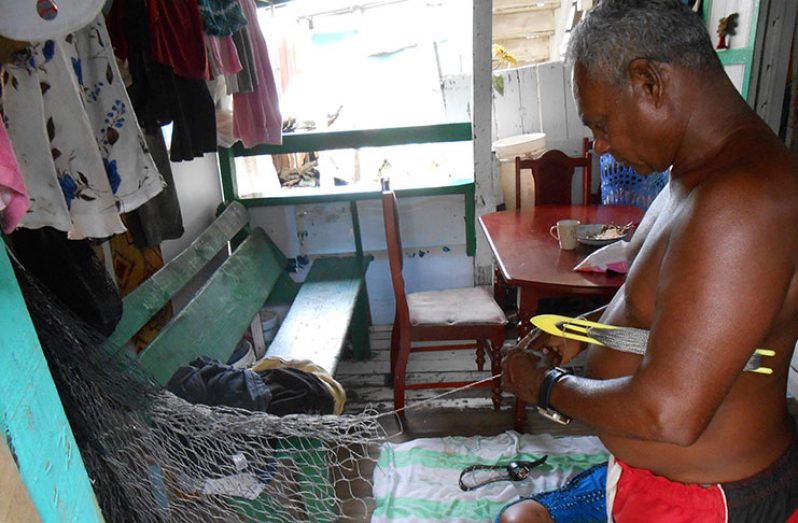By Neil Primus
THE wind picks up and grows into an angry whistling mass. The sea responds with heavy swells that would make seasoned seamen shiver. The small boat creaks, shudders then convulses in resistance to the enormous pressure of the water. The waves swat the boat anywhere it wants to.

Life, at times like this, seems somewhat like walking on a knife’s edge. The slightest wrong move or panic could result in tragedy.
This sounds like a good introduction to Moby Dick or Adventures at Sea. But this is only the simple life of a Guyanese fisherman who braves the dangerous waters in order to provide for his family. Some succeed; many have died trying.
FAMILY TRADITION
John Madramootoo is a 58-year-old great-grandfather who knows nothing else but the sea. His love for fishing was passed down to him by his father. His dad owned four boats, and at an early age, he was already going out onto the rough waters of the mighty Atlantic.
By his early teens, he was allowed to captain each vessel in turn. School suffered as a result, but such was the life of a fisherman’s son.
“I learned everything from my father,” John said. “Now I own two boats: A 20-footer and a 26-footer. The latter is under minor repairs.
“I have had to slow down myself because of injury. I slipped and fell, hitting my back on an anchor; this causes me constant pain, and restricts my trips to sea. But I never give up; I am still working in the fishing trade.
A STRONG MAN
“My father was a very strong man. At age 85, he would grab a paddle and go for a ‘walk’, paddling to friends along the bank of the river. He refused to use an engine on these outings.
“When he was not in a boat, he could be seen bursting wood for the fireside. He swung a mean axe.
“Dad hated ‘iced fish’; he only used fresh fish: Fresh from the sea, straight into the pot, and down empty bellies.
“Mom would make her famous ‘Fish Pot’. It comprised of fish, provisions, duff, onions, garlic, black pepper, butter and a few other ingredients I don’t recall now.
“When you ate this brew, you could feel the power coursing through your body. None of us ever had to be running to the doctor. Neither did dad. Good food and fresh sea breeze worked wonders for us.”
HARD WORK
Work at sea is not always successful; there are times when the catch is very small, and you lose on the trip.
At other times, the haul is great, and you make up for that loss. Then there is the added risk of damaging your equipment. Garbage in the sea is a serious health risk as well as an environmental hazard. It’s also a fisherman’s nightmare.

At high tide, the powerful sea moves tons of garbage around. These sometimes become entangled in your hooks or net, and cause expensive damages.
Take the case of a simple rice or flour bag: These are a terror to small fishermen; they collect mud and sand, and become dead weight. They then get entangled in your lines or nets.
Many times, the nets are badly damaged and the lines lost. One line can hold 2000 hooks. Whenever a line gets caught in the propeller, it results in engine failure and damage; a serious problem when you are at sea in a small craft.
BAD WEATHER
Weather changes at sea are very challenging times for small fishermen. The small boats roll, toss and pitch like matchboxes. Despite this, you still have to fish. Working a ‘six-hour drag’ means that every six hours, you must work your nets. Sometimes the boat dips dangerously in bad weather, causing one to have water way above one’s head.
Some souls have been lost at sea. Once, a wooden craft was hit by a humongous wave with such force that it ripped the vessel’s ice box off. Not yet done, the wave then smashed the cabin like matchsticks and proceeded to tear the craft to pieces. Luckily for the hapless crew, a trawler was nearby and came to their rescue. Thankfully, no one went down that day.
In situations where waves are over 20 feet high, small vessels are often in serious peril. If the craft is not properly built and maintained, it could end in catastrophe. Another danger to small boats are large, ocean-going ships. These are put on auto-pilot at night. Sometimes the crew of small fishing boats are resting after a tiring day’s work.
Bang! Their craft is so small that it is not seen in the dark. Add rough seas to that equation, and what you have is a recipe for disaster.




.jpg)










